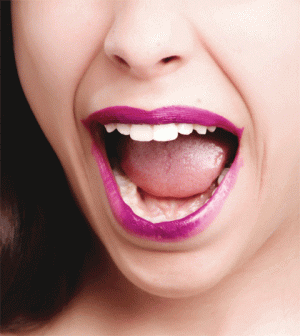- Mothering in a Fractured TimePosted 3 days ago
- Beneath the Surface: Revealing Life’s Goals nurtured from a Spiritual SeedPosted 6 days ago
- How We Kept Marital Peace while Traveling the World with Our KidsPosted 2 weeks ago
- How I Coped with Feeling Lost in a Changing SocietyPosted 2 weeks ago
- The Unexpected Liberation of a Butt DialPosted 2 months ago
- Why is France making abortion a constitutional right?Posted 2 months ago
What You Should Know About Tongue Scraping

By Andrea Donsky, RHN | Naturallysavvy.com
Every time you brush your teeth, do you also scrape your tongue? Tongue scraping is one of the healthy habits we frequently forget, but we’d like to help change that. What’s that hanging out on your tongue? How is it affecting your health? Let’s explore these and other questions!
What is tongue scraping?
Tongue scraping involves using a slightly rounded tool to gently scrape and remove unwanted particles and film from your tongue. It’s a habit that is recommended along with tooth brushing, flossing, and regular dental checkups.
Tongue scraping doesn’t replace brushing or other oral health habits. Instead, it is an added quick task that can provide significant health benefits.
Read about what is your tongue trying to tell you about your health
How is tongue scraping done?
You may have heard that brushing your tongue is as effective as using a tongue scraper. While brushing your tongue is better than not doing it at all, it’s recommended you use a scraper. In fact, a study found that the use of a tongue scraper removed 30 percent more bad breath causing substances (namely, hydrogen sulfide and mercaptans) than using a toothbrush.
Tongue scrapers can be made from stainless steel, copper, or plastic and are usually available wherever you buy your oral health products or on Amazon. Most of them are slightly rounded, similar to a spoon. In fact, you can use a clean spoon to scrape your tongue, but a dedicated scraper is much more effective.
Are you ready to scrape? Here goes!
- While in front of a mirror, stick out your tongue.
- Gently place the rounded end of the tongue scraper at the back of your tongue. If you’re a beginner, you may want to start at the middle of your tongue if you are worried about gagging.
- Slowly and gently pull the tongue scraper toward the tip of your tongue. Never go in the opposite direction.
- After each scrape, clean off the scraper with a tissue to remove the debris or rinse it under the tap.
- Repeat scraping until you have covered your entire tongue.
- Rinse your mouth with warm water.
- Wash the tongue scraper with soap and warm water, dry, and store in a clean, dry place.
- For best results, scrape after every meal.
Read about 7 reasons to switch your brand of dental floss now
What are the benefits of tongue scraping?
Over time, bacteria, food debris, and dead cells accumulate on your tongue. Brushing and flossing don’t address this situation. If, however, you take just a minute to scrape your tongue after every meal, you may enjoy the following benefits.
- Improve your sense of taste. Once you remove the bacteria and plaque from your tongue, you may be better able to distinguish between different taste sensations: sweet, salty, sour, and bitter.
- Protect heart health. Numerous studies have looked at cardiovascular disease and oral health. One such study found that oral health is associated with a heart attack and heart failure, but not a stroke. In a 2018 journal article, the authors noted that “Many studies, including systematic reviews and meta-analyses, suggest an important association between periodontal disease and ischaemic heart disease, cerebrovascular disease, heart failure, atrial fibrillation, and peripheral artery disease.”
- Improve overall oral health. When you get rid of the bacteria on your tongue, you may reduce your chances of developing gum disease, cavities, and other oral health challenges.
- Remove bacteria. Research has shown that scraping your tongue twice daily for a week can reduce the population of bacteria (Mutans streptococci and Lactobacilli) known to cause bad breath and dental decay. When you know that about 85 percent of all bad breath cases start in the mouth and that half of these are caused by tongue residues, you can see the importance of tongue scraping.
- Improve how your tongue looks. Does your tongue ever look coated and white? Scraping your tongue every day can help eliminate this coating.
What are the risks of tongue scraping?
Some people worry about gagging when they place the scraper on the back of their tongue. Until you get used to the feeling of the scraper on your tongue, start scraping from the middle. You will eventually get used to the sensation.
You should keep the word “gently” in mind as you scrape. Don’t apply too much pressure on your tongue or you may damage your taste buds or break the skin. Similarly, always make sure your tongue scraper doesn’t have any rough edges that may cut your tongue.
Other ways to enjoy good oral health
You can help protect and support overall oral health by:
- Brushing your teeth after every meal. A basic, natural toothpaste or even baking soda and water can do the job.
- Going for two minutes. Brush for at least two minutes. Play your favorite song while you brush.
- Flossing at least once daily.
- Avoiding the use of tobacco products
- Drinking water throughout the day to help prevent dry mouth, which contributes to cavities and bad breath.
- Scheduling regular checkups and cleanings with your dentist based on their recommendations.
- Enjoying foods that help clean your teeth, such as apples and raw carrots after a meal.
Bottom line
Tongue scraping is a fast and effective way to promote and support better oral health. Be sure to scrape your tongue after every meal and follow other oral health habits for optimal dental and overall health.
********
Feature Slider Image by: Oleg Magni
Sources
Almas K et al. The effect of tongue scraper on mutans streptococci and lactobacilli in patients with caries and periodontal disease. Odontostomatologie Tropicale 2005 Mar; 28(109):5-10.
Carrizales-Sepúlveda EF et al. Periodontal disease, systemic inflammation and the risk of cardiovascular disease. Heart Lung & Circulation 2018 Nov; 27(11):1327-34.
Holmlund A et al. Oral health and cardiovascular disease risk in a cohort of periodontitis patients. Atherosclerosis 2017 Jul; 262:101-106.
Pedrazzi V et al. Tongue-cleaning methods: a comparative clinical trial employing a toothbrush and a tongue scraper. Journal of Periodontology 2004 Jul; 75(7):1009-12.







